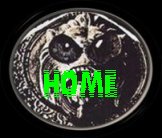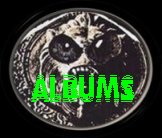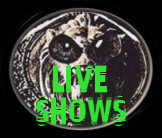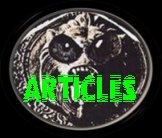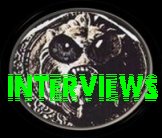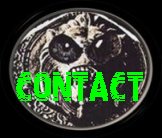Helios Creed
By: David
Under The Volcano - #22
1994
It would be fair to
say that many of the trademark sounds of contemporary music can be
directly traced back to Chrome, a San Francisco trio that forced
distorted vocals and a thudding undertow to collide with a barrage of
electronically enhanced guitar fuck. After leaving the band in '83,
guitarist Helios Creed continued to hold court with the demons in his
head and record an approximation of the ensuing melee for the public
via X Rated Fairy Tales and Superior Catholic Finger, recently reissued
together on one disc by Cleopatra Records entitled Helios Creed. In
addition to the Cleopatra reissues, Helios has an album called Planet X
coming out on Am Rep (described by Creed as a "return to my roots") and
is presently working on another LP for Cleopatra due out next year.
David Grad spoke to the world's noisiest guitarist over the phone in
September. -Rich
Under the Volcano:
Essentially, I'm sure you read your own promo material that the label
sends out and the liner notes on the records. You're always cited as
one of the most influential guitarists of the modern period. How would
you assess your contribution?
Helios Creed: Gee, I
just think over time, because I've been trying to do some strange
sounds on the guitar for so long it just accumulates, you know, and
people just... when they think of somebody whose been making different
stuff for such a long time, I guess they just start giving you credit.
Maybe you don't even deserve it, you know?
UTV: How did you start out? What inspired you to take your instrument and use it in such a different way?
Helios Creed: I guess
people like Robert Fripp and Jimi Hendrix, people like that. I'm
interested in tones and different effects... always looking to make a
new sound or improve an old one or something.
UTV: How did you originally get into playing guitar?
Helios Creed:
Actually, I was eleven or twelve I was always attracted to the
instrument. Some neighborhood kids made a band or something. This guy,
they called him Craterface because he had pimples all over his face,
and he made a band and all of the sudden he was real popular, even with
the girls, you know? I go "Wow, that's for me!" Not only did I like
guitar, but it seemed to make goofy looking kids popular. I got a
guitar for my twelfth birthday and I've been playing it ever since.
UTV: I think it was
on the liner notes on the Cleopatra release Helios Creed which combines
two of your post-Chrome CDs (X-Rated Fairy Tales and Superior Catholic
Finger) it talks about your reputation for drinking and drugging. Is
that deserved?
Helios Creed: Aah, drinking?
UTV: Yeah.
Helios Creed: Aaah, I
used to drink a lot I guess, back in the punk days and stuff, but I
sort of quit about three years ago. I haven't really had a drink in
three years. I guess I've slowed down, but I guess I had a wild
upbringing [laughs].
UTV: Did your drinking result in your ending up in a mental institution?
Helios Creed: It
probably did year. See, when I drank I got kind of crazy, not that I'm
just crazy anyway, and I guess the record companies like to bring that
up. [laughs] Something interesting about me. Of course, I was only a
kid when that happened. I was only like, eighteen years old, or
seventeen.
UTV: Yeah, and everytime I've seen anything about you it always refers to you being committed to a mental institution.
Helios Creed: I know,
and like, jeez, that was so long ago, and it was like, only for a few
days. I wasn't like I was committed or anything, y'know? It was just
like, "Where do you want to go, jail or here?" Oh, "I'll go there." It
wasn't like any big deal, and I guess that everybody wants to make a
big deal out of it, y'know?
UTV: What were you doing before Chrome?
Helios Creed: That's
what I was doing before Chrome, going to jail and shit. I was looking
for bands to play in is what I was doing before Chrome. People that I
could handle playing with and that could handle playing with me. It
just seemed that at that time the only thing people wanted to do in San
Francisco that I could find, people wanted hippies playing blues and
jazz, y'know? I guess it could drive a man to drinking.
UTV: And how did you end up in Chrome?
Helios Creed: Well, I
was attracted to those guys, because they made a record on their own
label, and it was a weird record, and it wasn't popular. That's what
attracted me to San Francisco in the first place, the psychedelic
history and stuff. Plus, I lived around there anyway, and back in like
'72 when I went there I was very disappointed in the place. Like I
said, all I could find where hippies wanting to play blues and jazz and
stuff, you know?
UTV: And what did you want to play?
Helios Creed: I wanted to play weird music. Like we did when me and Damon [Edge] made Alien Soundtracks. Like we did!
UTV: How did you meet Damon?
Helios Creed: Through
a friend of mine, Gary Spain, who played violin in my club band. I put
together this little thing at North Beach with acoustic guitar, violin.
It was some kind of weird folk thing. He said he was bass player in a
band called Chrome, and I go "Well, let me hear a record. You guys are
making records." I was very interested because that's what I wanted to
do, make records. I felt that was a way to get noticed besides playing
in a band, but it was a long time ago.
UTV: So you got
involved with Chrome and you were on their second record. Again, I'm
basing myself on the liner notes, but that second record was supposed
to be the soundtrack for a porn movie?
Helios Creed: Alien Soundtracks, yeah, half of it was supposed to be, and it was... turned down.
UTV: What kind of porno movie?
Helios Creed: For the Mitchell brothers.
UTV: Oh, really?
Helios Creed: Yeah.
UTV: Why did they turn it down? Too weird?
Helios Creed: Yeah,
it was too weird, so we decided to make the Alien Soundtracks album out
of it, and people sort of liked it, so we just kept going in that
direction.
UTV: A lot of the music that you've done sort of has this weird sexual edge toward it, doesn't it?
Helios Creed: Yeah, I guess you could say that.
UTV: Is that something that you sort of consciously put into your music?
Helios Creed: I just think that I'm a sexual pervert [laughs].
UTV: Would you care to expand on that a bit?
Helios Creed: Well, I
feel that music should be about sex a lot, but not all the time. Sex is
a good subject for music. People like to listen to music while they're
having sex.
UTV: When you say you're a sexual pervert....
Helios Creed: I'm just kidding. I'm not really...
UTV: Oh, we all are.
I tend to ask questions in my interviews that most people avoid. I
think musicians should go on with their sexual fantasies in rock mags.
It would make rock mags a hell of a lot more interesting, you know?
Helios Creed: Yeah, I think it's a good place to put your sexual fantasies.
UTV: What kind of sexual fantasies have you described in your music for instance?
Helios Creed: Well,
in Chrome once we had one sexual fantasy about an electric chair where
you just sort of get off by sitting in this electric chair and pumping
up voltage. Just strange things. That's one thing.
UTV: Was that actually part of a song?
Helios Creed: Yeah. It was called "Electric Chair." That was on an album called Red Exposure. I don't know, different songs.
UTV: If you had to describe that musical period in your life, how would you describe it?
Helios Creed: It was
a very fun time for me in a way, because we weren't accepted and we
were doing something different. I felt like we were doing something
that needed to be done, even though we weren't accepted.
UTV: Why do you think it needed to be done?
Helios Creed: Because
the music scene was so straight in a way, even though it was coming out
of like a disco like thing, a 70's kind of thing. It was sort of like
punk rock; it was around the same time as that.
UTV: It was very different from punk....
Helios Creed: Yeah,
it was very different. It was around the same time, and I guess we were
kind of squares for them too, because we were psychedelic, you know?
Psychedelia was square at the time...
UTV: In many ways,
that work was really ground breaking, and I certainly hear the
influences in a lot of the present stuff. Do you as well?
Helios Creed: Yeah, I
think so. We were like, using a lot of distorted vocals back in Alien
Soundtracks. Megaphone vocals on almost every song, and nobody was
doing that at all. Nowadays, so many big industrial bands, that's all
they use.
UTV: What other kinds of things do you see for instance?
Helios Creed: I see that and twisted guitar, there was no twisted guitar.
UTV: What do you mean by twisted guitar?
Helios Creed: Just
things not played in the blues rock scale. Most all guitar you ever
heard in the 70's was all very confined to a blues rock thing. I guess
we sort of broke that. We were just going off. Not like jazz, but
nonsense almost, which could sound good. There's good shit and there's
bad shit. I think we invented good shit. Good crap.... We helped invent
bad good music; music that sounded like garage and trashy, but yet
there was an appeal to it. The only way you could put out a record at
that time was be on a big label and sound all slick and all that
bullshit, and we sort of proved them wrong, that you could put out a
record that wasn't all slick and big and major industry type bullshit.
UTV: Who was putting out the Chrome records?
Helios Creed: We Were.
UTV: They were all independently released, right?
Helios Creed: Yeah,
and it was working. They said it couldn't be done. Us [Siren Records]
and like Ralph Records, we were like the first independent labels
around... We sued to take the records to the airport and send 'em all
over to different distributors on our own, and we inspired a lot of
people to do that too. Now there's so many independent labels and
independent bands that the big trend is to get signed. If you're not
signed you're like nowhere again, which is bullshit I think.
UTV: You've also been doing some interesting collaboration work recently with people like Nik Turner. How did that come about?
Helios Creed: Oh, I
have a friend, like Tommy in Pressurehed on Cleopatra, and I was a
Hawkwind fan when I was a kid. One thing led to another, and the next
thing we know is we all got the idea of going on tour together and lay
the old original Hawkwind songs and some old Helios songs, and some
Pressurehed songs, and we put it all together and called it Space
Ritual '94. It seems like all people were zeroing in on was either
industrial tripped out music, or grunge. It seemed appropriate to go
around an introduce people to space again.... There's an album too,
it's called Space Days, it's got all these bands on it. It's going to
be pretty interesting for people, I think it was just released on
Cleopatra. Kraftwerk, Hawkwind... Tangerine Dream, all these cool bands
that have been doing space for a long time.
UTV: You've been doing space for a long time. What attracted you to that particular theme?
Helios Creed: I don't
know; it just seems to fit what I want to do, and when you think about
it, psychedelic space rock is an underground music that's been around
ever since the 60's. It's never died, it's only gotten bigger... There
are still tones of people buying Tangerine Dream records and Kraftwerk
records and old Hawkwind. The thing never died. Old Chrome records are
still talked about. Even now, young kinds are still doing acid and
experimenting with their minds and sound.
UTV: What do you see as the future for your work? What are you working on now?
Helios Creed: I'm working with a lot of sampled sounds and unusual keyboard and guitar sounds. I'm searching for the lost tone.
UTV: What do you mean by "the lost tone"?
Helios Creed: Just a tone you've never heard before that appeals to people. That appeals to me.
UTV: How do you feel that an interview with Helios Creed should be concluded? What do you want to say to your legions of fans?
Helios creed: There's
probably millions of things I would think about after I hang up the
phone. Keep open minded, don't do too many stupid drugs and lose
yourself, and realize you can get high on simpler things in life than
you thought you could so you don't waste yourself.
Front Cover of Mag:

Images Appearing In This Interview:

